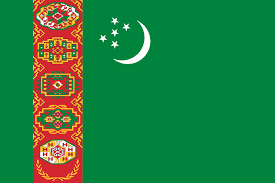Language/Turkmen/Vocabulary/Days-of-the-Week
Hi Turkmen learners! 😊
In this lesson, we will learn the days of the week in Turkmen as well as some interesting facts about them. Knowing the days of the week is important not only for language learning but also for planning and scheduling appointments, meetings, and events. Remember to practice using these words in context, and don't be afraid to make mistakes! Let's get started.
Don't forget to check out more vocabulary lessons on the Polyglot Club website.
Also, remember to find native speakers and ask them any questions.
Quick introduction to Turkmen language[edit | edit source]
Turkmen, also known as Turkmenistan Turkmen, is spoken in Turkmenistan as well as in some parts of Iran, Afghanistan, and Russia. It is a member of the Turkic language family, which includes other closely related languages such as Turkish, Azerbaijani, and Uzbek. Turkmen language has its own unique alphabet, based on the Latin script, but used to be written in the Arabic script until 1929 when the Soviet government tried to promote literacy and modernity. Modern Turkmen is now written with the Cyrillic script, but there is a campaign to return to the original Latin script.
If you are interested in learning more about the Turkmen language, you can check out the Wikipedia page or Omniglot.
The days of the week[edit | edit source]
Let's take a look at the days of the week in Turkmen:
| Turkmen | Pronunciation | English |
|---|---|---|
| Pazartesi | [pɑzɑɾtɛsi] | Monday |
| Sali | [sɑli] | Tuesday |
| Charshamba | [tʃɑɾʃɑmbɑ] | Wednesday |
| Payshanba | [pɑjʃɑnbɑ] | Thursday |
| Juma | [dʒumɑ] | Friday |
| Shanbe | [ʃɑnbɛ] | Saturday |
| Yekshanba | [jɛkʃɑnbɑ] | Sunday |
In Turkmen, the days of the week names consist of words borrowed from Persian and have been changed to fit Turkmen phonology. For example, Juma, the Turkmen word for Friday comes from the Persian word "jumah." Similarly, Shanbe, the Turkmen word for Saturday, comes from "shanbeh" in Persian. Pazartesi comes from the Turkish "pazar" which means "marketplace" while Yekshanba comes from the Turkmen word "yek" which means "one" and "shanba" which means "Saturday."
Dialogue[edit | edit source]
To help you see the days of the week in context, let's take a look at this dialogue:
- Person 1: Bu Charshamba gije, barýýar? — (Is Wednesday good for you?)
- Person 2: Belki Yekshanba gije bolýar. — (Maybe Sunday works for me.)
Conclusion[edit | edit source]
Congratulations! You have learned the days of the week in Turkmen. Remember to keep practicing and using them in context, and don't be shy to find native speakers to practice with.
Feel free to edit this wiki page if you think it can be improved. 😎
➡ If you have any questions, please ask them in the comments section below.
➡ Feel free to edit this wiki page if you think it can be improved. 😎
Upon wrapping up this lesson, take a look at these related pages:Relationships, Say Hello and Greetings in Turkmen, Days of the week & Clothes.
Other Lessons[edit | edit source]
- Transport
- Express Surprise
- Weather
- Days of the week
- Feelings and Emotions
- Family
- Geography
- House
- Basic Turkmen Phrases
- Geometry
Sources[edit | edit source]

